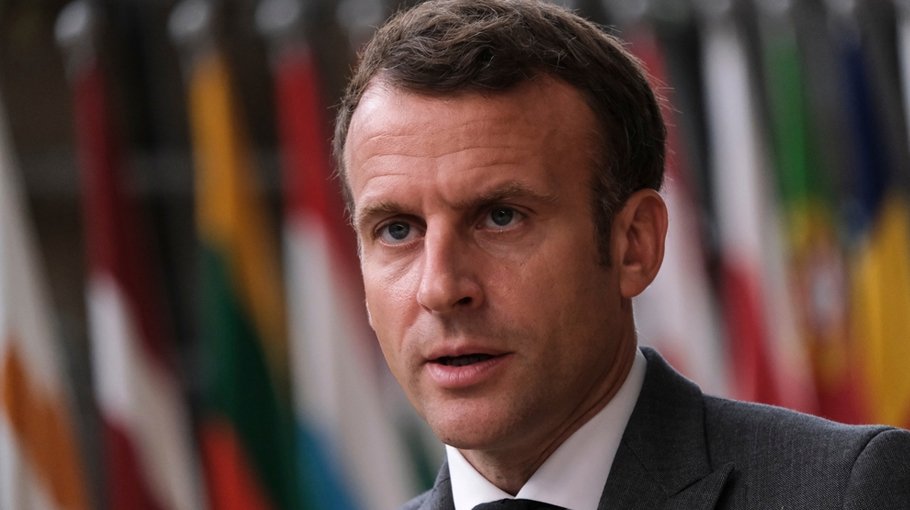Macron has a brand new vision for Europe

On Tuesday in a European first, France formally banned domestic air travel on short routes where the journey can be covered by train in under two-and-a-half hours.
It means that if you planned to travel from one of the airports surrounding Paris to, say Bordeaux, you simply won’t be able to. No, instead, it’s a matter of heading to the railway station rather than the airport.
Naturally enough, the French airline industry is up in arms at the measure that was included in a 2021 climate law and had mostly already been brought into force, and the carriers have asked the European Commission in Brussels to rule on whether the short domestic air travel ban is indeed legal.
The law does specify that train services on the same route must be frequent, timely and well-connected enough to meet the needs of passengers who would otherwise travel by air. And it also assumes that those trains won’t be affected by strikes — as much in France can be, and particularly when workers are faced now with the prospect of working until they are 64 before being able to claim the full state pension.
That legislation has been forced through by President Emmanuel Macron since March — and it remains a source of intense opposition from French workers.
But the decision to ban French short domestic air travel in the name of reducing carbon emission comes at a time when Macron’s actions seem at odds with the EU’s long-stated goals to become carbon neutral by 2050.
The lobby group for the French airline industry points out that it too will be carbon neutral by that year by switching to jet fuel from non-fossil sources and deploying battery — or hydrogen-powered aircraft.
Those are technologies that are being worked on now. But to make those technologies work and upscale them to levels that can power the French and wider European economy requires building and investing in plants and processes that are at odds with that goal of carbon neutrality.
Macron is determined to make his mark on the French economy during his second term, boosting job creation and making Europe’s second-largest economy independent — no small ask during this post-Covid period of high inflation and the uncertainty brought about by the conflict in Ukraine.
“Choose France”
In early May, the French president hosted some 200 international business leaders at a “Choose France” event at the Palace of Versailles to promote foreign investment. Those taking part included The Walt Disney Company’s Robert Iger to Lakshmi Mittal of Arcelor Mittal, a steel manufacturer, with Elon Musk also turning up to meet Macron and discuss the potential of the electric vehicle and energy sectors.
Recent economic initiatives totalling €13 billion (Dh51.4 billion) have been announced by Macron’s government — but lost in the noise of protests to his pension reforms.
The funds are going to support innovative industries and help transition towards greener technology, and include tax credits in fields like battery production, electric cars, hydrogen and wind power, as well as accelerating authorisation for industrial projects.
“France is changing, is getting adapted to the course of the world and I believe that we’re following the right path, which is to reindustrialise the country, to be more sovereign and more respectful of the climate and biodiversity,” Macron said on Friday during a visit to Dunkirk, in northern France.
Macron made time for selfies with workers from several local factories who attended his speech at Aluminium Dunkerque, one of the biggest aluminium production sites in Europe. While in the industrial city situated on the English Channel in northwest France and close to Belgium, the French president announced two major investments, both in the battery sector.
One, worth €5.2 billion by Taiwanese group ProLogium, the other one via a joint venture of China’s XTC with French energy giant Orano worth €1.5 billio. Together, they’ll bring nearly 5,000 jobs by 2030. With those types of numbers, it’s easy to see why Macron seems willing to play fast and loose with EU climate goals.
New industrial model
The northern industrial belt stretching into south Belgium used to be the heart of coal mining and associated heavy industries that powered national economic numbers. Now, Macron is determined to drive a new industrial model for a greener economy.
ProLogium’s Dunkirk plant is the fourth battery plant in development in northern France. China’s Envision Group, French start-up Verkor and ACC, a venture backed by carmakers Stellantis, Mercedes-Benz and oil and gas group TotalEnergies, are also planning battery plants in the region.
Macron said 300 new factories had been created since 2017 — two thirds in the past two years — while 600 had been shut down in the previous decade.
Controversially, Macron also called last week for a “pause” on EU environmental regulations, arguing the bloc of 27 already imposes tougher rules than its competitors. The comments prompted immediate criticism from French and European Green politicians.
Macron insisted he was sticking to his climate-related commitments, including all policies aimed at making the EU carbon neutral by 2050. The EU also plans that by the end of this decade, it will be 55 per cent of the way toward that goal.
It’s a tough sell, but the million dollar question is: Will president Macron succeed?
Mick O’Reilly is Foreign Correspondent at Gulf News. Source: Gulf News



